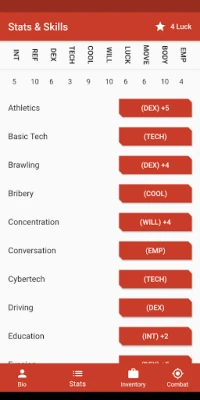
Latest Version
6.1.14
December 08, 2024
Andrew Sheridan
Entertainment
Android
0
Free
com.andrewsheridan.cyberpunk_red_companion
Report a Problem
More About Cyberpunk Red Companion
Mastering Character Management in Role-Playing Games
In the world of role-playing games (RPGs), the ability to create and manage characters and non-player characters (NPCs) is crucial for an immersive experience. This article delves into the essential aspects of character management, including tracking vital statistics, rolling for initiative, and enhancing your gameplay through strategic purchases and leveling up.
Creating Engaging Characters and NPCs
Character creation is the foundation of any RPG. Players invest time in developing unique personas that reflect their imagination and storytelling desires. When crafting a character, consider the following:
- Background and Lore: Develop a rich backstory that informs your character's motivations and personality.
- Class and Race: Choose a class and race that align with your character's abilities and narrative. This choice impacts gameplay significantly.
- Appearance and Traits: Define your character's physical attributes and personality traits to enhance role-playing opportunities.
For NPCs, ensure they serve a purpose in the story. Whether they are allies, enemies, or quest-givers, their design should contribute to the overall narrative.
Tracking Vital Statistics
Effective character management involves meticulous tracking of various statistics that influence gameplay. Here are the key elements to monitor:
- Hit Points (HP): Keep a close eye on your character's health. HP determines how much damage a character can sustain before falling in battle.
- Armor Class (AC): This statistic reflects your character's ability to avoid damage. Higher AC means better protection against attacks.
- Ammunition and Equipment: Track the quantity and condition of your weapons and ammunition. Managing resources is vital for survival in challenging encounters.
- Skills and Abilities: Each character possesses unique skills and abilities. Regularly update these as your character progresses through the game.
Rolling for Initiative
Initiative rolls determine the order of actions in combat scenarios. Understanding how to roll for initiative can significantly impact the outcome of battles. Here’s how to approach it:
- Dice Mechanics: Most RPGs use a specific die (often a d20) to determine initiative. Familiarize yourself with the rules governing your game.
- Modifiers: Consider any modifiers that may affect your roll, such as character traits or equipment bonuses.
- Strategic Positioning: Positioning your character effectively can provide advantages in combat, allowing for better initiative rolls.
Purchasing New Items
As your character progresses, acquiring new items becomes essential for enhancing abilities and survivability. Here are some tips for effective item management:
- Understanding the Marketplace: Familiarize yourself with the in-game economy. Knowing where to find the best items can save you valuable resources.
- Prioritizing Needs: Assess your character's current strengths and weaknesses. Invest in items that will bolster your character's capabilities.
- Trade and Barter: Engage with NPCs for potential trades. Sometimes, you can acquire valuable items without spending gold.
Leveling Up Your Character
Leveling up is a rewarding aspect of RPGs, allowing characters to grow and evolve. Here’s how to maximize this process:
- Experience Points (XP): Engage in quests and battles to earn XP. Understanding how XP is awarded can help you strategize your gameplay.
- Skill Trees: Many RPGs feature skill trees that allow you to customize your character's abilities. Choose paths that align with your playstyle.
- Character Development: As you level up, consider how your character's story evolves. This adds depth to your gameplay experience.
Conclusion
Mastering character management in RPGs enhances both gameplay and storytelling. By creating engaging characters, tracking vital statistics, rolling for initiative, purchasing new items, and leveling up effectively, players can immerse themselves in rich narratives and thrilling adventures. Embrace these strategies to elevate your RPG experience and enjoy the journey ahead!
Rate the App
User Reviews
Popular Apps










Editor's Choice































